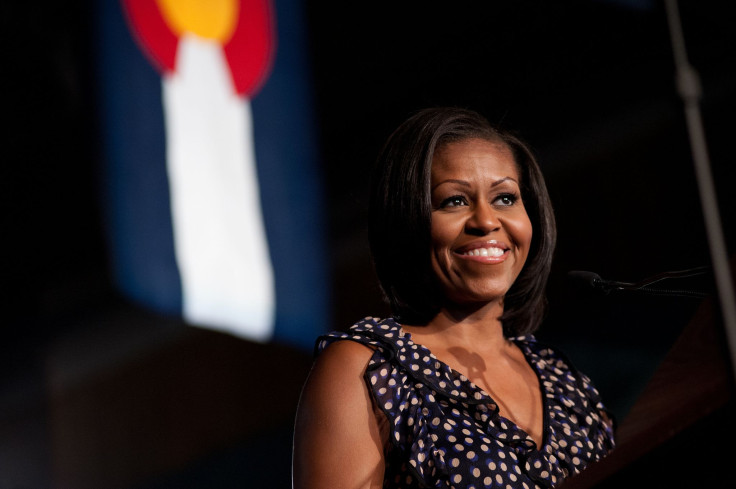Millennials Choose Michelle Obama As The Best Role Model For Women: Sign Body Image Is Improving?

A recent study published in Social Psychological & Personality Science found men want women at any size despite the number of women who think men want someone like Beyoncé or model Kate Upton. A new poll from Fusion supported these findings — at least they did from a millennial’s perspective.
Fusion partnered with Benenson Strategy Group to conduct their “Massive Millennial Poll” during the second week of January. They surveyed 1,000 people between the ages of 18 to 34 over the telephone, asking questions regarding everything from body image, to politics and smoking pot with their parents. And when it came to body image, things got interesting.
Both millennial men and women said first lady Michelle Obama and actress Jennifer Lawrence were the top two role models for women. Men, in fact, ranked FLOTUS above J-Law (26 compared to 21 percent), while the actress had an edge over Obama for women (29 compared to 25 percent). Basketball player LeBron James and actors Channing Tatum and Chris Pratt were considered the best role models for men. Though women were more in favor of Channing Tatum, which Fusion speculated has to do with how much more they physically see him.
Choosing FLOTUS as the best role model for women is refreshing for two reasons: 1) She’s a non-traditional celebrity; 2) She’s the face of the country’s movement toward greater health and wellness. As a reminder, Obama founded the Let’s Move! campaign — an initiative she launched to solve the challenge of childhood obesity (though the whole family can and should get involved). She’s frequently promoting the benefits of eating well and getting regular exercise. And if she’s not talking about it, she’s showing it. Who can forget how she bested daytime TV host Ellen DeGeneres in a push-up contest?
In their analysis, Fusion pointed to the fact women usually feel the pressure to be stick-thin. From traditional magazines to filtered Instagram photos, women (and men) are constantly presented with best-case scenarios of a person's body. Social media makes the perception of body image particularly difficult. In a separate body image survey from Glamour, researchers found 54 percent of women ages 18 to 40 were unhappy with their body (a 13 percent increase from their last survey in 1984) as a result filtered and cropped photos. Additional research found women become less happy with their bodies as they spend more time on Facebook, which researchers concluded can put them at risk for eating disorders.
So millennial men and women choosing someone who fiercely advocates for health and wellness is perhaps a sign the body image conversation is shifting for the better.
J-Law is a noteworthy choice, too. In a 2011 interview with Extra TV, correspondent Steve Santagati told the actress she was “in great shape, not that Hollywood skinny thing” and he remembered hearing she had a Philly cheesesteak before the Academy Awards as opposed to the standard salad. Lawrence confirmed the story, prompting Santagati to ask if she’s going to be able to “keep that real, the more the cameras are on you.”
“I’m not a crazy binge-eater,” she replied. “If I want a Philly cheesesteak, I’ll eat a Philly cheesesteak. ... I eat healthy, and I exercise, and I like my body and I actually don’t want to look emaciated. Food is one of my favorite parts of the day, so I can’t imagine ruining it by replacing delicious food with asparagus spears. If you’re not happy with yourself, then you’re just never going to be happy no matter what magazines you look at. So you just need to be happy with yourself.”
Lawrence has, in fact, continued to promote this idea of balance as her career has grown. In 2013, she told Barbara Walters it should be illegal to call someone fat on TV, "because why is humiliating people funny?" The actress takes how women are portrayed very seriously. BBC spoke to her about her role in The Hunger Games, and she explained how she advocated for her character, heroine Katniss Everdeen, to look "strong and healthy."
"When we were doing the first The Hunger Games, it was a big discussion, 'cause it's called The Hunger Games — she's from District 12, she's obviously underfed, so she would be incredibly thin. But, I just kept saying, 'We have the ability to control this image that young girls are going to be seeing,'" Lawrence said. "Girls see enough of this body that we can't imitate, that we'll never be able to obtain, these unrealistic expectations, and this is gonna be their hero, and we have control over that."



























